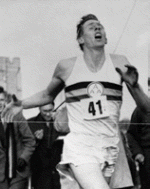 SKC Films Library SKC Films Library |
| SKC Films Library >> Recreation >> Track and Field Athletics >> Biography |
 Sir Roger
Bannister Sir Roger
Bannisterthe first man to break the four-minute mile, Roger Gilbert Bannister was born in Harrow, Middlesex, England, on March 23, 1929. His family moved to Bath soon after outbreak of World War II. As he was growing up he showed a talent for running, and won several races. In 1946 he earned a scholarship to Oxford University. Upon graduation from Oxford he began studying medicine at St. Mary's Hospital Medical School in Paddington. Although his studies took up a considerable amount of his time, Bannister was able to continue his "track career." In 1951 he captured the British title for the 1500-meter. At the 1952 Helsinki Olympics, however, he finished a disappointing fourth in the same event. Despite his less-than-stellar performance at Helsinki, Bannister was convinced that it was possible for a man to break the four-minute mile. His medical studies helped him research the mechanical aspects of running, and he developed a training method that focused on consistency rather than long, arduous workouts. Despite his unorthodox methods, his time gradually improved over the next couple of years. On May 6, 1954, at a track meet in Oxford, Bannister set out to prove that his methods had not been in vain. The run would not be a true race, however. Instead, Bannister enlisted the assistance of two friends, Chris Brasher and Chris Chataway, to act as pacemakers. Bannister allowed Brasher to take the initial lead and set a consistent, easy pace. When Brasher began to tire, Chataway took the lead. Then, with 200 yards to go, Chataway backed off and Bannister sprinted across the line, setting a world record of 3 minutes, 59.4 seconds. Although Bannister's record was broken by Australian John Landy a month or so later, Sports Illustrated rated Bannister's accomplishment as one of the most significant athletic feats of the 20th century (along with the climbing of Mount Everest). At the British Empire Games in Vancouver later that same year, Bannister met Landy in a head-to-head mile race, and won with a time of 3:58.8 (Landy ran a 3:59.6). Britain awarded Bannister with the Silver Pears Trophy, which recognizes the most outstanding British achievement in any field. Having broken the four-minute mile mark, Bannister returned to his medical studies and subsequently became an accomplished neurologist. He continued running until 1975, when he broke his ankle in a car accident and was forced to give up the sport. He was knighted in 1975. Bannister's autobiography, First Four Minutes, was published in 1955; it was later reprinted as Four-Minute Mile. WEB SOURCE SEE ALSO |
| SKC Films Library >> Recreation >> Track and Field Athletics >> Biography This page was last updated on May 25, 2017. |